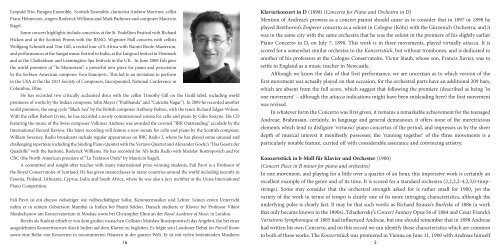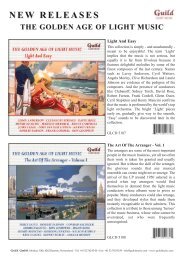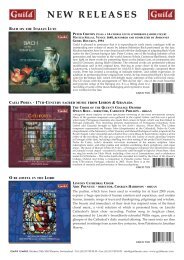MARC ANDREAE VOLKMAR ANDREAE
MARC ANDREAE VOLKMAR ANDREAE
MARC ANDREAE VOLKMAR ANDREAE
Erfolgreiche ePaper selbst erstellen
Machen Sie aus Ihren PDF Publikationen ein blätterbares Flipbook mit unserer einzigartigen Google optimierten e-Paper Software.
Leopold Trio, Paragon Ensemble, Scottish Ensemble, clarinetist Andrew Marriner, cellist<br />
Franz Helmerson, singers Roderick Williams and Mark Padmore and composer Mauricio<br />
Kagel.<br />
Some concert highlights include concertos at the St. Endellion Festival with Richard<br />
Hickox and at the Scottish Proms with the RSNO, Wigmore Hall concerts with cellists<br />
Wolfgang Schmidt and Tim Gill, a recital tour of S.Africa with Naomi Boole-Masterson,<br />
and performances at the Sangat music festival in India, at the Langvad festival in Denmark<br />
and at the Cheltenham and Leamington-Spa festivals in the UK. In June 2009 Fali gave<br />
the world premiere of “In Memoriam”, a powerful new piece for piano and percussion<br />
by the Serbian-American composer Vera Stanojevic. This led to an invitation to perform<br />
in the USA at the the 2013 Society of Composers, Incorporated, National Conference in<br />
Columbus, Ohio.<br />
He has recorded two critically acclaimed discs with the cellist Timothy Gill on the Guild label, including world<br />
premieres of works by the Indian composer, John Mayer (“Prabhanda” and “Calcutta Nagar”). In 2009 he recorded another<br />
world premiere, the song cycle “Black Sea” by the British composer Anthony Bolton, with the tenor Richard Edgar-Wilson.<br />
With the cellist Robert Irvine, he has recorded a newly commissioned sonata for cello and piano by Giles Swayne. His CD<br />
featuring the music of the Swiss composer Volkmar Andreae was awarded the coveted “IRR Outstanding” accolade by the<br />
International Record Review. His latest recording will feature a new sonata for cello and piano by the Scottish composer,<br />
William Sweeney. Radio broadcasts include regular appearances on BBC Radio 3, where he has played some unusual and<br />
challenging repertoire including the Sinding Piano Quintet with the Vertavo Quartet and Alexander Goehr’s “Das Gesetz der<br />
Quadrille” with the baritone, Roderick Williams. He has recorded for All-India Radio with Mstislav Rostropovich and for<br />
CBC (the North-American premiere of “La Trahison Orale” by Mauricio Kagel).<br />
A committed and sought-after teacher with many international prize-winning students, Fali Pavri is a Professor of<br />
the Royal Conservatoire of Scotland. He has given masterclasses in many countries around the world including recently in<br />
Estonia, Finland, Lithuania, Cyprus, India and South Africa, where he was also a jury member at the Unisa International<br />
Piano Competition.<br />
Fali Pavri ist ein ebenso vielseitiger wie vielbeschäftigter Solist, Kammermusiker und Lehrer. Seinen ersten Unterricht<br />
nahm er in seinem Geburtsort Mumbai in Indien bei Shanti Seldon. Danach studierte er Klavier bei Professor Viktor<br />
Merdschanow am Konservatorium in Moskau sowie bei Christopher Elton an der Royal Academy of Music in London.<br />
Bereits als Student erhielt er von dem großen russischen Cellisten Mstislaw Rostropowitsch das Angebot, ihn bei einer<br />
ausgedehnten Konzerttournee durch Indien auf dem Klavier zu begleiten. Es folgte sein Londoner Debut im Purcell Room<br />
sowie eine Reihe von Konzerten in renommierten Häusern in der ganzen Welt. Er ist mit vielen bedeutenden Musikern<br />
16<br />
Klavierkonzert in D (1898) (Concerto for Piano and Orchestra in D)<br />
Mention of Andreae’s prowess as a concert pianist should cause us to consider that in 1897 or 1898 he<br />
played Beethoven’s Emperor concerto as a soloist in Cologne (Köln) with the Gürzenich Orchestra, and it<br />
was in the same city with the same orchestra that he was the soloist in the premiere of his slightly earlier<br />
Piano Concerto in D, on July 7, 1898. This work is in three movements, played virtually attacca. It is<br />
scored for a somewhat similar orchestra to the Konzertstück, but without trombones, and is dedicated to<br />
another of his professors at the Cologne Conservatoire, Victor Staub, whose son, Francis Xavier, was to<br />
settle in England as a music teacher in Newcastle.<br />
Although we know the date of that first performance, we are uncertain as to which version of the<br />
first movement was actually played on that occasion, for the orchestral parts have an additional 209 bars,<br />
which are absent from the full score, which suggest that following the premiere (described as being ‘in<br />
one movement’ – although the attacca indications might have been misleading here) the first movement<br />
was revised.<br />
In whatever form the Concerto was first given, it remains a remarkable achievement for the teenaged<br />
Andreae; Brahmsian, certainly, in language and general demeanour, it offers none of the meretricious<br />
elements which tend to disfigure ‘virtuoso’ piano concertos of the period, and impresses us by the sheer<br />
depth of musical interest it menifestly possesses; the ‘running together’ of the three movements is a<br />
particularly notable feature, carried off with considerable assurance and convincing artistry.<br />
Konzertstück in b-Moll für Klavier und Orchester (1900)<br />
(Concert Piece in B minor for piano and orchestra)<br />
In one movement, and playing for a little over a quarter of an hour, this impressive work is certainly an<br />
excellent example of the genre and of its time. It is scored for a standard orchestra (2,2,2,2-4,2,3,0-timpstrings).<br />
Some may consider that the orchestral strength asked for is rather small for 1900, yet the<br />
variety of the work in terms of tempo is clearly one of its more intruging characteristics, although the<br />
underlying pulse is clearly fast. It may be that such works as Richard Strauss’s Burleske of 1886 (a work<br />
that only became known in the 1890s), Tchaikovsky’s Concert Fantasy Opus 56 of 1884 and César Franck’s<br />
Variations Symphonique of 1885 had influenced Andreae, but one should remember that in 1898 Andreae<br />
had written his own Concerto, and on this record we can identify those characteristics which are common<br />
to both of these works. The Konzertstück was premiered in Vienna on June 11, 1900 with Andreae himself<br />
5

















